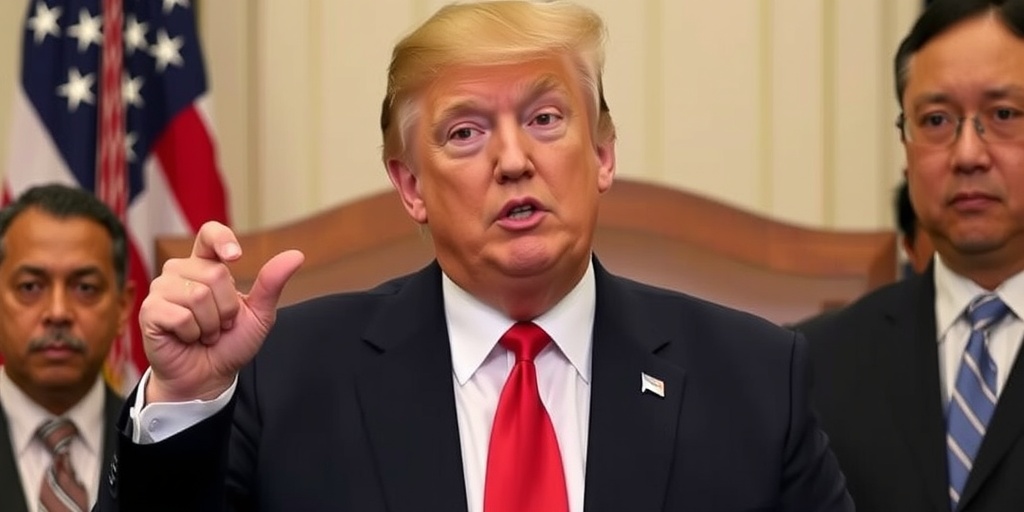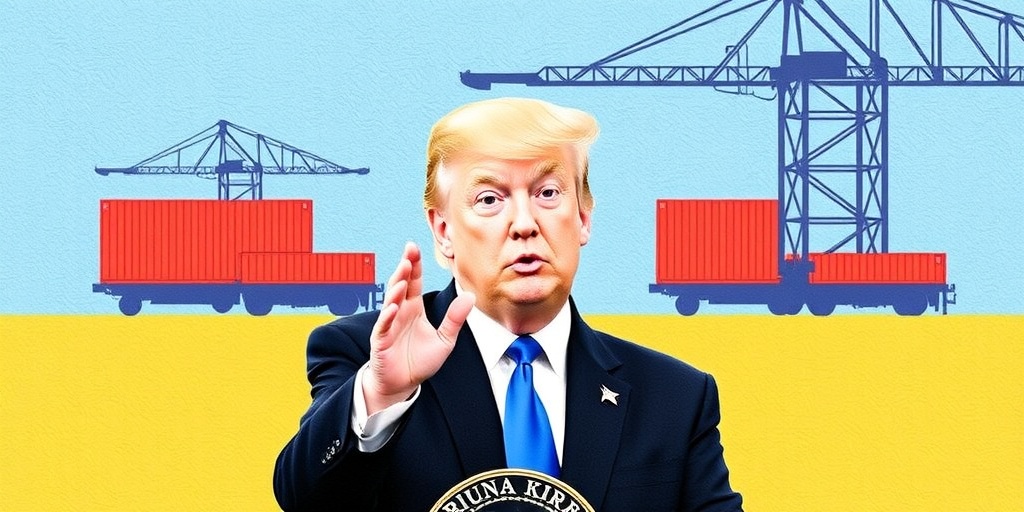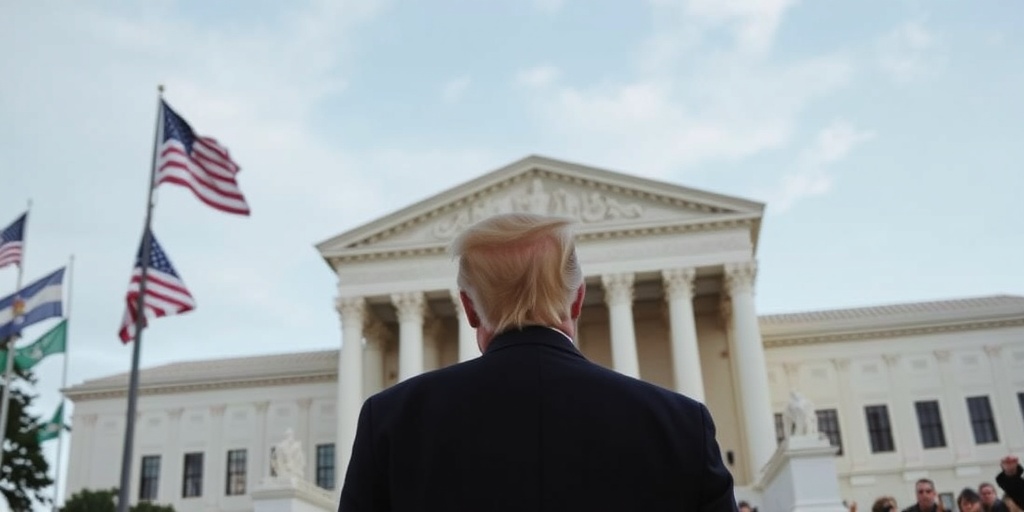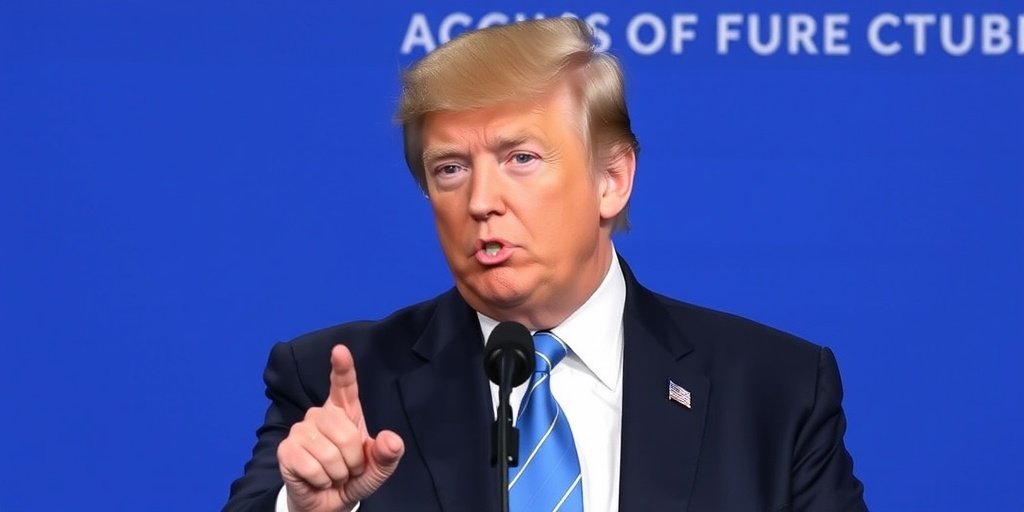Now Reading: Trump Escalates Global Trade Threats
-
01
Trump Escalates Global Trade Threats
Trump Escalates Global Trade Threats
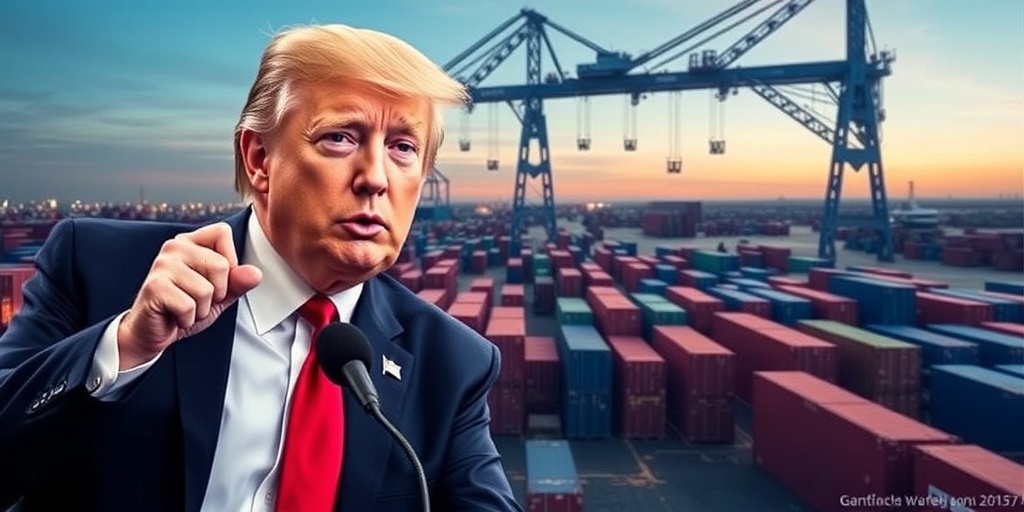
Title: Trump’s Trade Threats Continue to Escalate Tensions with Key Allies
In a continuing series of aggressive trade maneuvers, President Donald Trump has ramped up threats to impose steep tariffs on essential imports from close allies, further fueling a trade war that he initiated. The ongoing back-and-forth has raised concerns over potential economic fallout and the possibility of deepening disputes between the U.S. and its trading partners.
On a recent Thursday morning, Trump announced via social media that he might impose a staggering 200 percent tariff on European wine and Champagne unless the European Union (EU) dropped a 50 percent tariff on U.S. whiskey. This move came after the EU had introduced the tariff in response to new levies that Trump had enacted on global steel and aluminum earlier that week.
Before this, on Tuesday, Trump had issued a similar threat directed at Canada, proposing to double the existing 25 percent tariffs on Canadian steel and aluminum. His intention was to pressure the province of Ontario into removing a surcharge on electricity sold to the United States, a charge that was put in place after Trump previously imposed tariffs on Canadian imports. In a rare retreat, Trump dialed back on his threat after Ontario agreed to suspend the electricity surcharge.
Over recent weeks, the President has appeared to orchestrate a confusing and potentially damaging cycle of tariff threats, engaging in what some analysts describe as a global game of chicken intended to force concessions from the United States’ closest allies and trading partners. However, these tactics seem to come with a disregard for their economic implications. Following Trump’s threats against Europe, the S&P 500 index experienced another slump, indicating concerns in the financial markets over the volatile trade environment.
When pressed on whether he might temper his stance on Canada, Trump remained resolute, asserting, “I’m not going to bend at all.” He expressed a dismissive attitude towards the necessity of Canadian imports, such as lumber and energy—failing to acknowledge Canada’s position as one of America’s largest trading partners. “We don’t need anything they have,” he proclaimed, dismissing the economic interdependencies that exist between the two nations.
During a press event with Mark Rutte, the secretary-general of NATO, Trump acknowledged the potential for “a little disruption” caused by his tariffs but insisted that any negative effects would be temporary. “And we have to do this,” he stated firmly, reiterating his commitment to his trade strategy.
Treasury Secretary Scott Bessent echoed this sentiment, downplaying concerns about market volatility and the immediate economic repercussions of Trump’s trade policies. "We are not concerned about the short term," he declared, framing the tariffs within a broader context of protecting American jobs and strategic industries.
Commerce Secretary Howard Lutnick warned other nations to think carefully before retaliating. He suggested that Trump’s temperament may influence responses to any retaliatory actions. "If you make him unhappy, he responds unhappy," Lutnick noted. While some nations like Britain and Mexico have opted to carefully assess their business dealings with the United States, other nations such as China and the European Union seem more willing to engage in retaliatory measures.
The potential for an escalating trade war looms large. European officials, sensing the seriousness of the situation, have expressed their intent to push back against the U.S. pressure. Ursula von der Leyen, president of the European Commission, emphasized Europe’s need to safeguard its consumers and businesses in the face of threats, proclaiming, “We will not give in to threats.”
The response from Canada has been equally defiant. Chrystia Freeland, a former Canadian finance minister, warned that Canada would retaliate economically, stating, "If you hit us, we will hit back." She highlighted Canada’s significance to the U.S. economy by pointing out that it is the largest export market for the United States, surpassing China, Japan, the U.K., and France combined.
On the international front, Canada has officially launched a dispute at the World Trade Organization (WTO) regarding the steel and aluminum tariffs, following in the footsteps of China, which filed a suit over different tariffs last month. However, such WTO actions may be largely symbolic due to the United States’ previous actions that rendered the organization’s dispute resolution capabilities ineffective.
As global tension mounts and trade relationships are strained, the situation remains fluid. Canadian officials are scheduled to meet with Lutnick to discuss ongoing trade issues, while the European Union’s trade commissioner is set to confer with U.S. representatives in an effort to navigate the choppy waters of international trade relations. With Trump’s administration signaling further tariffs on cars and other products on the horizon, the potential for broader economic conflict remains ever-present, leaving many to wonder how these tensions will ultimately play out.
As the trade dispute unfolds, the ramifications could extend beyond simple tariff adjustments, affecting political relationships and economic stability across the globe. All eyes will be focused on how both allies and rivals respond to the unfolding situation in the coming weeks.
Stay Informed With the Latest & Most Important News
Previous Post
Next Post
-
 01New technology breakthrough has everyone talking right now
01New technology breakthrough has everyone talking right now -
 02Unbelievable life hack everyone needs to try today
02Unbelievable life hack everyone needs to try today -
 03Fascinating discovery found buried deep beneath the ocean
03Fascinating discovery found buried deep beneath the ocean -
 04Man invents genius device that solves everyday problems
04Man invents genius device that solves everyday problems -
 05Shocking discovery that changes what we know forever
05Shocking discovery that changes what we know forever -
 06Internet goes wild over celebrity’s unexpected fashion choice
06Internet goes wild over celebrity’s unexpected fashion choice -
 07Rare animal sighting stuns scientists and wildlife lovers
07Rare animal sighting stuns scientists and wildlife lovers













